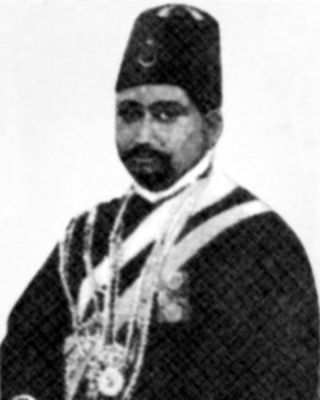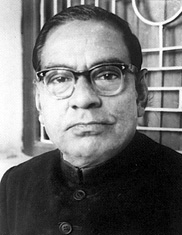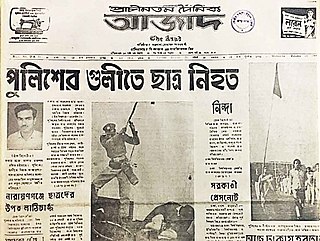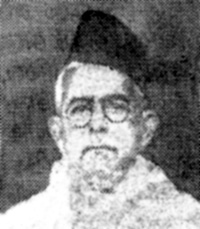Related Research Articles

The Bengali language movement was a political movement in former East Bengal advocating the recognition of the Bengali language as an official language of the then-Dominion of Pakistan to allow its use in government affairs, the continuation of its use as a medium of education, its use in media, currency and stamps, and to maintain its writing in the Bengali script.

East Bengal was a non-contiguous province of the Dominion of Pakistan. Geographically part of the Bengal region, East Bengal existed from 1947 until 1955, when it was renamed East Pakistan. Today, the area is an independent country, Bangladesh. With its coastline on the Bay of Bengal, it bordered India and Myanmar. It was located close to, but did not share a border with, Nepal, Tibet, the Kingdom of Bhutan and the Kingdom of Sikkim. Its capital was Dacca, now known as Dhaka.

Syed Ismail Hossain Siraji was a Bengali author and poet from Sirajganj in present-day Bangladesh. He is considered to be one of the key authors of period of the Bengali Muslim reawakening; encouraging education and glorifying the Islamic heritage. He also contributed greatly to introducing the Khilafat Movement in Bengal, and provided medical supplies to the Ottoman Empire during the Balkan Wars. Anal-Prabaha, his first poetry book, was banned by the government and he was subsequently imprisoned as the first South Asian poet to allegedly call for independence against the British Raj. The government issued Section 144 against him 82 times in his lifetime.
Syed Ali Ahsan was a Bangladeshi poet, writer and university academic. He was awarded Ekushey Padak (1982) and Independence Day Award (1987) by the Government of Bangladesh. In 1987, he was selected as the National Professor of Bangladesh. He was credited as the official English translator of the National Anthem of Bangladesh.

Abul Mansur Ahmad, born Ahmad Ali Farazi, was a Bangladeshi politician, writer, and journalist.

The Nawab of Dhaka, originally spelt in English Nawab of Dacca, was the title of the head of largest Muslim zamindar in British Bengal and Assam, based in present-day Dhaka, Bangladesh. The title of nawab, similar to the British peerage, was conferred upon the head of the family by Queen Victoria as a recognition of the first Nawab's loyalty and contribution to the social welfare activities.

The Azad was a Bengali-language daily newspaper published from 1936 to 1992. The Azad became Dhaka's first daily newspaper. The newspaper, while based in Dhaka, played an important role during the Bengali Language Movement for its advocacy of Bengali.

The East Pakistan Renaissance Society was a political organisation formed to articulate and promote culturally and intellectually the idea for a separate Muslim state for Indian Muslims and specifically for the Muslims of Bengal. The organisation's founders and leaders included Abul Kalam Shamsuddin, the society president, Habibullah Bahar Chowdhury and Mujibur Rahman Khan.

Mohammad Akram Khan was a Bengali journalist, politician and Islamic scholar. He was the founder of Dhaka's first Bengali newspaper, The Azad. He was among the founders of Jamiat Ulama-e-Hind.

According to the 2011 census, West Bengal has over 24.6 million Muslims, making up 27% of the state's population. The vast majority of Muslims in West Bengal are ethnic native Bengali Muslims, numbering around over 22 million and comprising 24.1% of the state population. There also exists an Immigrants Urdu-speaking Muslim community numbering 2.6 million, constituting 2.9% of the state population and mostly resides in Urban areas of the state.

Munīruzzamān Khān Islāmābādī, also known by the epithet Biplobi Maulana, was a Muslim philosopher, nationalist activist and journalist from Islamabad in Bengal Presidency, British India. He was among the founders of the Jamiat Ulama-e-Hind.

Bengali Muslims are adherents of Islam who ethnically, linguistically and genealogically identify as Bengalis. Comprising about two-thirds of the global Bengali population, they are the second-largest ethnic group among Muslims after Arabs. Bengali Muslims make up the majority of Bangladesh's citizens, and are the largest minority in the Indian states of West Bengal, Tripura and Assam.

Anjuman-i-Ulama-i-Bangala, was an association of Muslim religious leaders in British India's Bengal Presidency. It later formed a branch of the Jamiat Ulema-e-Hind by the name Jamiat Ulema-e-Bangala in 1921.
The Bengal Provincial Muslim League (BPML) was the branch of the All India Muslim League in the British Indian province of Bengal. It was established in Dacca on 2 March 1912. Its official language was Bengali. The party played an important role in the Bengal Legislative Council and in the Bengal Legislative Assembly, where two of the Prime Ministers of Bengal were from the party. It was vital to the creation of the Dominion of Pakistan, particularly after its election victory in 1946.
Ahmed Ali Enayetpuri was a Bengali writer, journalist, and politician.
Muhammad Wajed Ali was an East Pakistani Writer and Journalist.

Karatia Zamindari was a zamindari family based in the Tangail District of Bangladesh.
Muhammad Abdullah al-Baqi was a Bengali Islamic scholar, writer and politician. As a member of the Central Legislative Assembly, he played an active role in the Indian independence movement. He was a prominent leader of the Ahl-i Hadith movement in North Bengal, and played a significant roles in pre-partition Ahl-i Hadith conferences.
Ajmal Ali Choudhury was a politician and former Minister of Commerce of Pakistan. He was also a member of the 4th National Assembly of Pakistan. His close relationship with Muhammad Ali Jinnah and contributions during the 1947 Sylhet referendum led to him being known as the Sylhet's Quaid by his supporters. However, he became heavily criticised after supporting Pakistan during the Bangladesh Liberation War.
Muhammad Naimuddin was a Bengali Islamic scholar, writer and journalist. He was the chief editor of the Akhbare Islamia.
References
- ↑ "Maulana Akram Khan: Pioneer of Bengali Muslim journalism". The New Nation. Retrieved 5 June 2018.
- ↑ Chatterji, Joya (2002). Bengal Divided: Hindu Communalism and Partition, 1932-1947. Cambridge University Press. p. 68. ISBN 978-0-521-52328-8.
- 1 2 Mowla, AHM Shafiqul. "Mohammadi, The". Banglapedia. Retrieved 5 June 2018.
- ↑ "Ali, Muhammad Wajed - Banglapedia". en.banglapedia.org. Retrieved 28 October 2018.